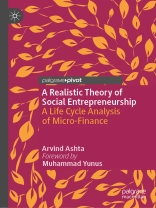Using evidence from the microfinance sector, which is considered a leading sector of social entrepreneurship, this book attempts to push the boundaries of research in this field. While recent studies consider that commercial enterprises, not-for-profits and social enterprises are formed by entrepreneurs with different personal identities, they do not explain why these personalities may change before they convert their social enterprises, and change further at the stage of transitioning into commercial enterprises. Presenting a theory of development and evolution for social enterprises which examines the dynamics associated with change, impact and growth and an in-depth critical view of motivation, funding and profit, this book examines how that impacts the social mission and enterprise structure in the wake of hybrid and for-profit models and corporate philanthropy. The author highlights the ‘cracks’ in social entrepreneurship and asks how they are being filled, institutionally.
Spis treści
Chapter 1: Introduction: The Need for a Dynamic Theory on Social Entrepreneurship.- Chapter 2: Social Entrepreneurship Theoretical Work Has Been Static.- Chapter 3: Dynamics of a Life Cycle Theory Based on Developed Country Histories.- Chapter 4: Evolution of Developing Country Microfinance and Financial Inclusion.- Chapter 5: Extending the Realistic Theory to a Dynamic Life Cycle Theory of Social Enterprise.- Chapter 6: Concluding Remarks on Social Entrepreneurship Theory Development, Teaching, and Future Research.
O autorze
Arvind Ashta is a Senior Professor at the Burgundy School of Business, France.












